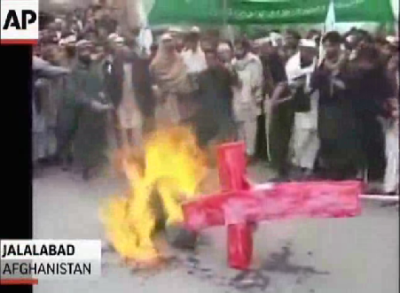Afghans Burn Cross in Fury Over Civilian Killings
Christians to Pay the Price for US Soldier's Deadly Rampage?
According to observers, the Christian community in Afghanistan could be targets of retaliation after a U.S. soldier allegedly killed 16 Afghan civilians Sunday, causing a mob of angry Afghans to burn a cross and an effigy of President Barack Obama in the ensuing protests. Some experts predict the burning of the cross could mean more trouble for Christians, who have already been experiencing persecution in the war-torn country.

Anger against Americans and other foreign presence is growing in Afghanistan, experts say, noting that it was less than a month ago that burning of copies of the Quran by NATO soldiers enraged the nation's Muslim population. The recent civilian killings allegedly by a U.S. soldier has brought renewed calls for American troops to leave, and hostile feelings toward Christians, who are reportedly associated with Americans and other Westerners.
Hundreds of students in eastern Afghanistan on Tuesday shouted anti-U.S. slogans as they carried a red cross and then burned it amid chants of "God-is-Great," a video from The Associated Press reveals. It was the first significant protest in response to the shooting rampage in Panjwai in Afghanistan's volatile Kandahar province on Sunday that left 16 people dead.
A 38-year-old U.S. Army staff sergeant, whose name has not been disclosed, is suspected to have carried out the massacre.
Experts fear that the Panjwai massacre might have tragic consequences for Afghanistan's vulnerable Christian minority. The Christian community has often experienced adversity in the mostly Muslim country, where the 2004 constitution effectively established Sharia as the law of the land.
"Conditions for religious freedom remain exceedingly poor [in Afghanistan] for minority religious communities and dissenting members of the majority faith, despite the presence of U.S. armed forces in Afghanistan for almost 10 years," the U.S. Commission on International Religious Freedom (USCIRF) recently reported.
Individuals lack protection to dissent from state-imposed orthodoxy, debate the role and content of religion in law and society, advocate for the human rights of women and members of religious minorities, or question interpretations of Islamic precepts, the governmental agency said in its report.
Christians in Afghanistan also tend to be targeted on a daily basis by Muslims, who often use the codes of Islamic law against believers, leveling charges of blasphemy, for example, against those who speak against Islam, sources have told The Christian Post.





























